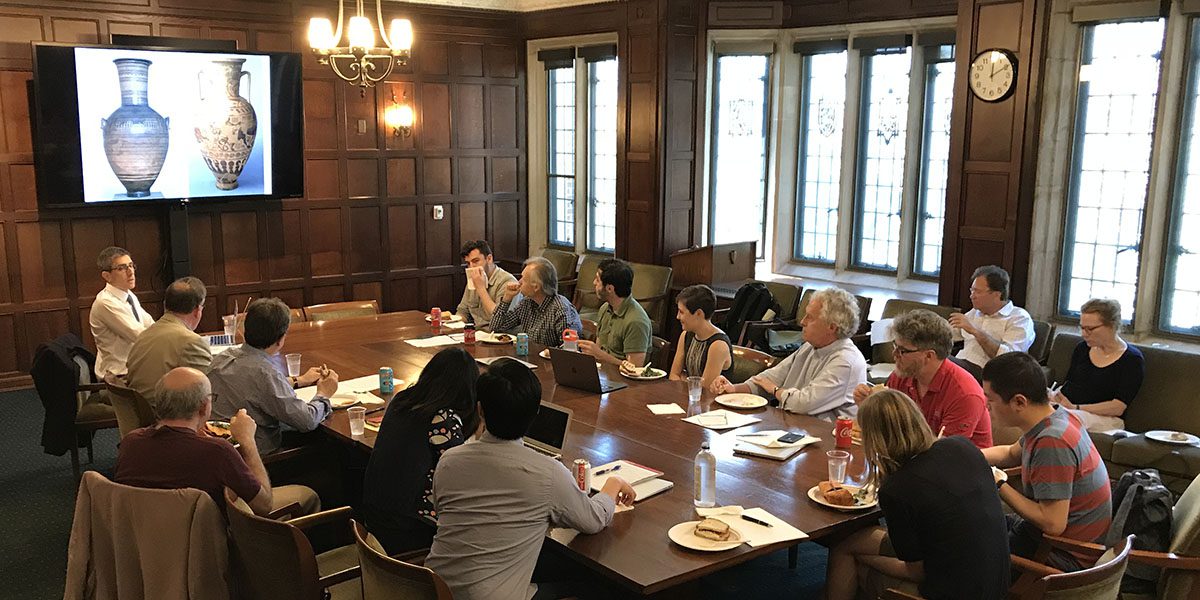Overview
The Council offers funding of $5,000 to $20,000 to help pairs or groups of faculty develop a collaborative area of focus that will generate research or teaching in emerging or underrepresented fields in the humanities. We particularly invite exploratory projects designed to identify potential partners and spark collaborations at Princeton or to develop a substantial Princeton component for multi-institutional and/or international collaborations. Unlike Magic grants, these projects typically have funding support from multiple sources and may include regular academic formats such as reading groups, conferences, workshops, planning meetings, and other gatherings. Grants are typically made for one year (and for two or three years maximum, if there is a clear rationale for a multi-year endeavor).
Collaborations already underway and initiated outside this rubric, including Magic Grants, are also eligible for funding, if a project has reached a new phase or direction. Collaborative Humanities grants are intended to launch or reshape projects but cannot sustain ongoing projects for the long term.
We invite cross-disciplinary proposals that are collaborative and publicly engaged, and we particularly encourage proposals that align with the Humanities Council’s stated priorities.
Eligibility
Regular Princeton faculty (assistant, associate, full professors; senior lecturers; University Lecturers; and professors of the practice) may apply.
NOTE: Preference will go to applicants who have not received a substantial grant from the Humanities Council in the past academic year.
How to Apply
Faculty interested in the opportunity should contact Kathleen Crown, Executive Director, as early as possible.
The online application form (available one month in advance of the deadline) will require the following documents as attachments:
1. A brief, compelling abstract of the proposal (up to 250 words), clearly stating who is involved, what the funds will be used for, and where, when, and how it will be carried out. It should further convey what makes the project innovative and potentially important. Please take care to craft an abstract that is clear about the project timeline (start and end dates), key participants, costs covered, and locations. The abstract should be able to stand on its own as an overview of the project, covering all key aspects and goals of the proposal.
2. A detailed proposal for the full project, which must include the following:
- project title
- name(s) of proposer(s)
- principal units/institutions involved, and any financial commitments from those units
- start and end dates, schedule of when all work will be done
- collaborative nature of the project and any project history
- project’s benefit to Princeton University faculty and students
- names of Princeton faculty and students who will be involved
- intended non-University participants, with names and affiliations if known
- a detailed budget (travel, lodging, food, materials, honoraria) for the full project, indicating all amounts contributed by, or solicited from, other offices on campus, particularly the host department. Please note that the executive committee has established a benchmark of $750-$1500 for honoraria for public lectures and $75-$500 for a class visit or conference/colloquia participation.) If you propose greater amounts, please provide a compelling rationale. If you propose to bring international visitors to campus, please consider whether the goals of the project could be realized with a virtual visit.
- total cost of the project
- amount requested from the Humanities Council
3. Proposals require a statement of support from Chair/Director of the academic unit committing to manage the funds, provide logistical support, and (in most cases) offer some departmental financial support. If the application does not include this statement of support, a request will be emailed to the Chair/Director of the unit. The endorsement is not required to be submitted by the application deadline; they will be due by February 10.
Proposals under serious consideration may be reviewed by faculty experts in the relevant fields, in consultation with the Council of Science and Technology, the Center for Digital Humanities, the McGraw Center for Teaching and Learning, the Lewis Center for the Arts, the Dean of Research, the Dean of the College, and other campus offices.
Grant ApplicationDeadlines and Grant Cycles
Note: There will be two cycles of grant applications in AY24-25.
- TBD: Funding Information Session, 16 Joseph Henry House at 12:00 pm
- January 10, 2025: Deadline to send draft proposal (second round) review to Kathleen Crown/Esther Schor.
- January 24, 2025: (second round): Deadline to submit application.
- February 2025: Executive Committee deliberations.
- March 2025: Notification of decisions.
- July 2025: Funds will be transferred after the start of the 2025 fiscal year (begins July 1, 2025).
- May 15, 2025 Grantees must submit final reports on completed projects using an online form. Links will be provided, along with reminders from the Council.
Global Initiatives
Several large-scale research and teaching collaborations receive multi-year support from the Humanities Council.
- See a full list of Humanities Council funding opportunities.
















